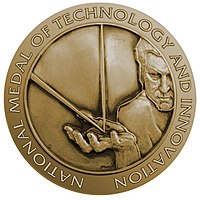
Photo from wikipedia
Personalized medicine (PM) bridges several disciplines for understanding and addressing prevalent, complex, or rare situations in human health (e.g., complex phenotyping, risk stratification, etc.); therefore, digital and technological solutions have… Click to show full abstract
Personalized medicine (PM) bridges several disciplines for understanding and addressing prevalent, complex, or rare situations in human health (e.g., complex phenotyping, risk stratification, etc.); therefore, digital and technological solutions have been integrated in the field to boost innovation and new knowledge generation. The open innovation (OI) paradigm proposes a method by which to respectfully manage disruptive change in biomedical organizations, as experienced by many organizations during digital transformation and the COVID-19 pandemic. In this article, we focus on how this paradigm has catalyzed the transition from PM to personalized digital medicine in a large-volume research hospital. Methods, challenges, and results are discussed. This case study is an endeavor to confirm that OI strategies could help manage urgent needs from the healthcare environment, while achieving sustainability-oriented, accountable innovation.
Journal Title: Journal of Personalized Medicine
Year Published: 2022
Link to full text (if available)
Share on Social Media: Sign Up to like & get
recommendations!